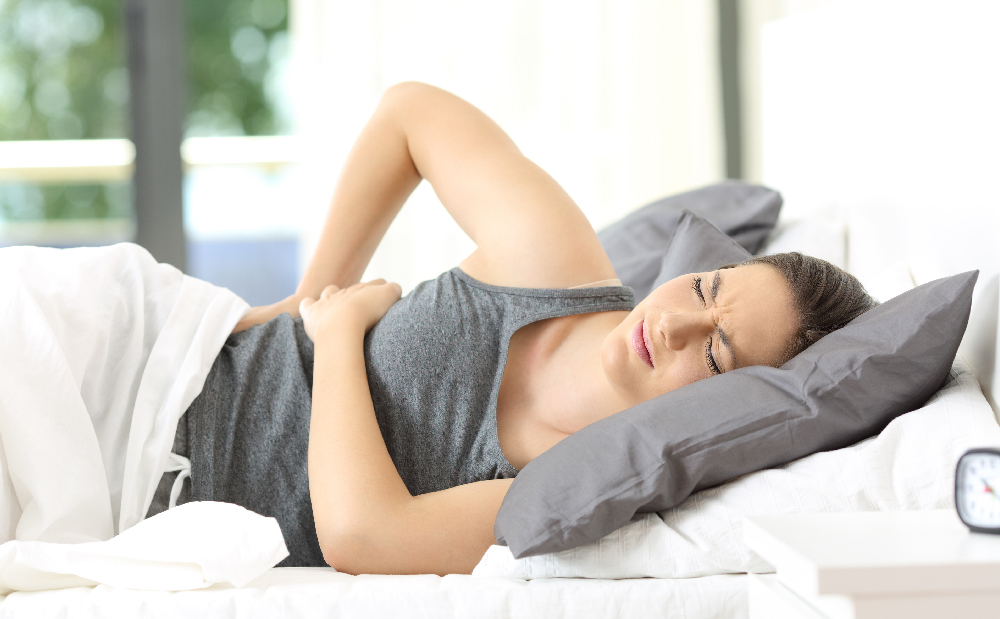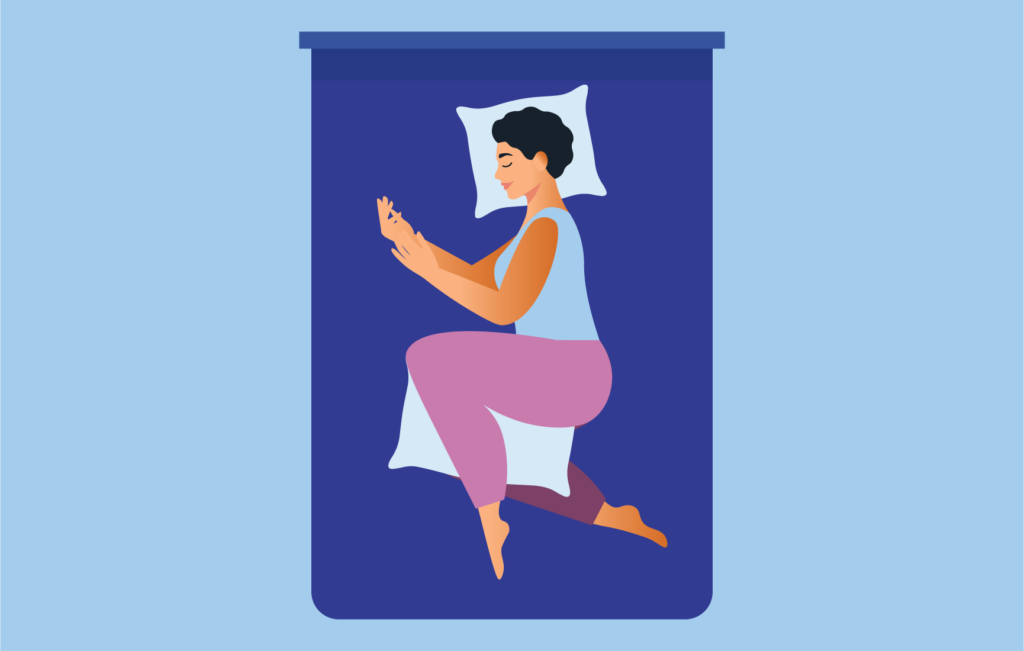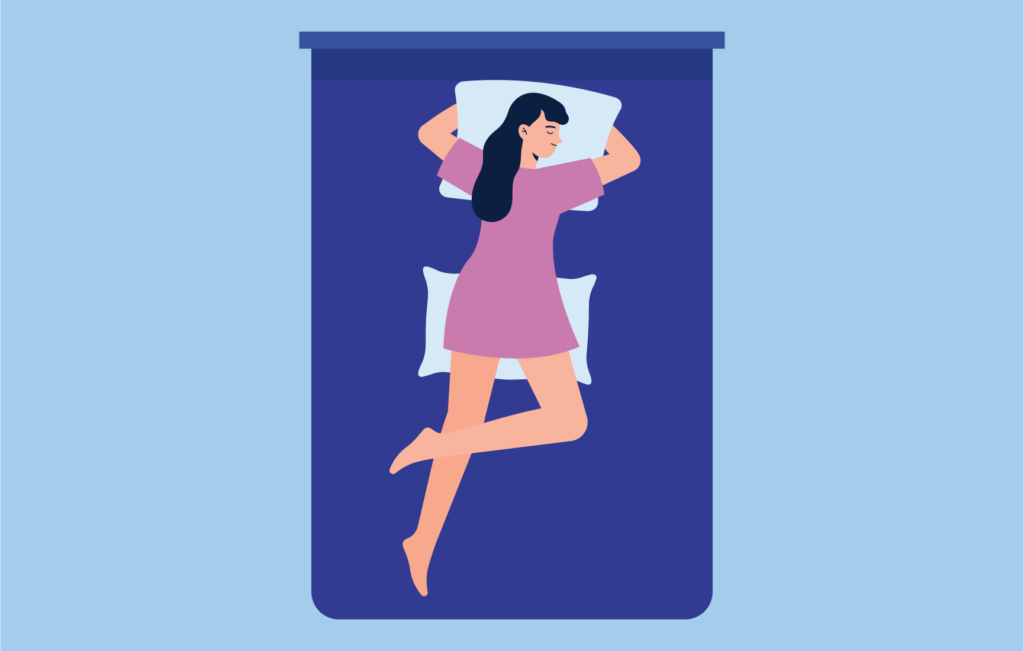
Getting through the day with nagging hip pain isn’t easy, and when it’s time to go to bed, you might be dreading the inevitable toss and turn. And it’s not just you — research shows an association between hip joint issues and problematic sleep, which may be worsened by anxiety and insomnia in addition to the pain itself. (1) (2) On the other hand, poor sleep can also worsen hip pain, creating a negative cycle. (3)
Sleep is so important for our health, even more so when we’re suffering from chronic pain. (4) Fortunately, if you’re living with hip pain, there are things you can do to ease some of the discomfort at night. We’ve rounded up some expert tips on how to sleep with hip pain, including the best sleep positions and recommended mattresses.
Note: The content on Sleepopolis is meant to be informative in nature, but it shouldn’t be taken as medical advice, and it shouldn’t take the place of medical advice and supervision from a trained professional. If you feel you may be suffering from any sleep disorder or medical condition, please see your healthcare provider immediately.
Long Story Short
- Hip pain may be caused by odd sleeping positions, an unsupportive mattress, a physical injury, or an underlying disease. Regardless, it can make sleeping comfortably difficult.
- Some of the best things you can do to improve sleep with hip pain are to sleep on your side or back, use a supportive pillow to promote spinal alignment and make sure you have a medium-firm mattress that supports your body.
- Consider how you can improve your sleep hygiene habits, add home remedies for pain management, and seek medical guidance from your healthcare provider and/or a specialist like a chiropractor or physical therapist (PT) when necessary.
What Causes Hip Pain?
Hip pain can arise from several underlying causes, each affecting the hip joint and surrounding tissues differently. (5) If you’ve ever tweaked your hip, whether from an intense workout, running too far, or tripping over your kid’s Lego bin, you know the frustrating pain that can resonate from these one-time events.
Your hips can also feel the consequences of sleeping in a weird position or having an old or unsupportive mattress. Any woman who has ever been pregnant can also attest to the sometimes unbearable hip pain that can result from the significant change in the center of gravity, as well as the hormonal and physical changes that result from pregnancy. (6)
Hip pain may also have other medical-related causes, such as:
- Arthritis: Osteoarthritis is a degenerative joint disease characterized by the gradual breakdown of cartilage. Rheumatoid arthritis is a chronic inflammatory autoimmune disorder that primarily affects the joints. These are both common culprits of hip pain, leading to inflammation and the breakdown of cartilage, which is the protective tissue that cushions the ends of bones within joints. (7) (8)
- Hip fractures: Often due to falls or osteoporosis, fractures can cause severe pain and require immediate medical attention.
- Bursitis: Inflammation of the bursae, small fluid-filled sacs that cushion the hip joint, can lead to pain and discomfort. (9)
- Tendinitis: Overuse of the hip tendons can cause inflammation and pain, particularly in athletes or individuals with repetitive motion tasks. (10)
- Muscle or tendon strain: Overstretching or overusing the muscles and tendons around the hip can result in strain and pain. (11)
- Hip labral tear: Damage to the labrum, the cartilage surrounding the hip socket, can cause pain and joint instability. (12)
- Hernia: Inguinal and femoral hernias can cause referred pain to the hip area. (13)
- Nerve issues: Conditions like sciatica, where the sciatic nerve is compressed or irritated, can cause radiating pain to the hip. (14)
- Infections: Joint infections can lead to hip pain, often accompanied by fever and swelling. (15)
As you can see, there are numerous reasons why your hips could start hurting and understandably contribute to trouble sleeping. Speaking with a healthcare provider for treatment options can be helpful in many of these situations.
Tips for How to Sleep With Hip Pain
It’s time for bed and you’re in the all too familiar scenario of trying to figure out the best way to lay that doesn’t cause excruciating pain and stiffness in the morning. What should you do?
We examined what the research says about sleep position, choosing a good mattress, and home remedies for managing hip pain. We also spoke to experts who gave practical tips for improving your restfulness, today and down the road.
According to Preston Benjamin, D.C. of Enhance Life Chiropractic, there are two main ways to approach hip pain: short-term care and long-term correction. He tells Sleepopolis, “Short-term care is about getting your body to feel less pain in the moment so you can go about your daily life in less pain. Long-term correction is about identifying the root cause of the pain and addressing that issue.”
Benjamin says that when facing hip pain, it’s important to get a professional diagnosis of what’s causing your pain versus relying on the internet for a diagnosis.
Let’s dig into what you can do about your hip pain, starting with sleep positions.
The Best Sleep Positions to Alleviate Hip Pain
Hip pain or not, we all have to sleep. You may be surprised to learn how different sleeping positions can affect your hip pain at night — for better or worse. Here’s how being a side, back, or stomach sleeper may impact hip pain and what you can do to improve comfort. (Spoiler alert: alignment is key!) (16)
Side Sleeping

Side sleeping is often recommended for those with hip and spinal pain as it can alleviate pressure on the affected hip. (17) For instance, if you’re dealing with left hip pain, you might want to try sleeping on your right hip instead.
You might also find it helpful to alternate which side you sleep on to prevent worsening pain on one side from prolonged pressure.
Sometimes adding a pillow to your side-sleeping position can help support your body in a way that alleviates hip pain. Benjamin says, “If you’re more of a side sleeper, you can put a pillow between your knees to keep the hips more in alignment. The less torque we can have on the hips from that top leg hanging down the better.” Furthermore, he says you can also use a long body pillow to either put between your knees or to have on your backside to support you and keep you in the side-lying position.”
Back Sleeping
D.C. Jason Loth of Spine Align says hip pain may cause some folks to be unable to sleep in their preferred position, such as the side. For side sleepers with same-side hip pain, Loth encourages them to consider switching to their back to prevent pressure on the hip.
Sleeping on your back can evenly distribute your weight and minimize pressure points, which may help alleviate some of your hip pain at night. (18)
Benjamin says, “Sleeping on your back causes the least amount of strain on your hips and lower back. If lying on your back causes you low back and hip discomfort you can put a pillow under your knees.” (18)
However, physical therapist Keith Poorbaugh, owner of Northern Edge Physical Therapy, cautions that “most people suffering from hip pain are middle-aged adults (35-55). This is the same age group [most likely to] suffer from sleep apnea, which is aggravated with sleeping on the back.” Of course, this changes when those with sleep apnea seek treatment and introduce any sort of PAP device into their bedtime routines — knowing your body and your needs is key here.
Stomach Sleeping

Stomach sleeping is generally not recommended for hip pain as it can exacerbate the issue by creating an unnatural arch in the lower back, leading to increased pressure on the hips. (18)
If you’re a natural stomach sleeper, try putting a thin pillow underneath your pelvis to see if this helps reduce strain on your hips and lower back. Benjamin notes that, if possible, “You want to avoid sleeping on your stomach, as this places the most stress on the lower back and hips.” He adds that sleeping on your back causes the least amount of strain on these areas. With this in mind, you may consider trying to gradually transition to a side or back sleeping position, which may also help reduce pain over time.
Overall, Poorbaugh notes that you should be able to find a comfortable position to sleep in no matter what underlying condition is causing your pain. He says your goal should be to find a position in which your hips are centered and relaxed.
Hip Pain in Pregnancy
What about hip pain when you’re pregnant? This is one of the many reasons a body pillow makes such a good friend during pregnancy.
A pregnancy pillow can support your body, especially between your knees, to align your hips and reduce pressure. Many providers recommend pregnant women sleep on their side, ideally the left, to improve blood flow, reduce discomfort, and take some of the pressure off of the kidneys and liver. However, recent studies suggest that one side isn’t safer than the other — it just depends on what’s more comfortable for you. (19)
How to Pick a Mattress for Hip Pain
In addition to your sleeping position, what you’re sleeping on matters for managing hip pain at night. Loth says that it is essential to have a high-quality, supportive mattress. He says that sleeping on a worn-out mattress will cause the mattress to sag. If this happens, your hips will not be supported properly, and your pain could worsen.
A medium-firm mattress is often recommended for hip and lower back pain, as it balances support and cushioning, helping to maintain proper spinal alignment and reducing pressure on these areas. (20)
As for what the mattress is made of, memory foam or latex mattresses can be particularly beneficial because they contour to the shape of your body. This can help evenly distribute your weight and alleviate pressure points. (20)
It’s also important to look for a mattress with good motion isolation to minimize disturbances if you share the bed with someone else. Try out different mattresses in-store or opt for one with a generous trial period (many of them have a 100-day option). Ultimately, everybody is different, and the type of mattress that feels good for one person may not work well for another, so try to be open-minded and willing to explore different options.
For more in-depth guidance when choosing a new mattress, see our guide on the best mattress for hip pain.
Managing Nighttime Pain
We’ve covered your sleeping position and how the type of mattress you’re sleeping on can impact your hip pain, but that’s not all you can do to improve comfort.
Hip Strengthening Exercises
Benjamin says addressing hip mobility before bed is a priority for short-term pain management. Many of us live with tight hips due to how sedentary we are much of the time. He says several exercises can help before bed (ideally around 10 minutes before you lie down), including:
Pigeon
- From all fours, bring your right knee forward towards your right wrist. Depending on your body it may be just behind your wrist or to the outer or the inner edge of it.
- Experiment with what feels right for you, giving you a stretch on your outer hip without any discomfort in your knee.
- Your right ankle will be somewhere in front of your left hip.
- Slide your left leg back and point your toes, your heel is pointing up to the ceiling.
- Scissor your hips together, by drawing your legs in towards each other. Use some support under your right buttock if needed, to keep your hips level.
- As you inhale, come onto your fingertips, lengthen your spine, draw your navel in and open your chest.
- As you exhale, walk your hands forward and lower your upper body towards the floor. You can rest your forearms and forehead on the mat.
- Stay for 5 breaths or longer.
- On each exhalation, try to release the tension in your right hip.
- To come out of the pose, push back through the hands, lift your hips and move your leg back into all fours. Repeat on the other side.
Frog Squat
- Start with your feet shoulder-width apart: Position your feet at shoulder width or slightly wider.
- Initiate the squat: Lower your body down by bending your hips and knees. Keep your chest up and your back straight.
- Heels down: Aim to keep your heels flat on the ground. If this is challenging, you can use a rolled-up mat or wedge to provide support under your heels.
- Upright posture: Maintain an upright posture with your chest lifted and your spine aligned.
- Hands placement: You can place your hands together in front of your chest, use your elbows to push your knees gently outward, or simply let your arms hang.
- Hold and breathe: Hold the squatting position for 20-30 seconds. Focus on deep breathing to help relax into the position.
Figure 4 Stretch
- Lie on your back with your feet flat on the floor.
- Cross your right ankle over your left knee and keep your right foot flexed.
- Bring your left knee toward your chest. Reach your right hand through your legs and interlace your fingers just below the crease of your left knee.
- Using your arms, pull your left knee toward your chest, pausing when you feel a stretch in your right glute and hip.
- Hold there for at least five breaths (though you can hold the stretch for up to two minutes) then release and repeat on your left side.
Aim to do hip strengthening exercises regularly and gradually increase reps as your strength improves; however, it’s important to remember to listen to your body and avoid overexertion — “no pain, no gain” doesn’t apply here.
Furthermore, Benjamin emphasizes the importance of a long-term care plan for hip pain management in addition to these day-to-day strategies. The position of your hips is directly correlated with the pain you’re experiencing, which is related to your career, hobbies, and at-home activities. “From there, we can look at postural corrections that can be made. For example, changing the way you sit at work, creating a sit-stand routine for desk work, and incorporating stretching times throughout the day,” he says.
Benjamin continues, “Along with these lifestyle changes, your medical provider should recommend some exercises that will target the muscles in your pelvis that have been found to be weak based on the exam.” For instance, clam shells (lying on your back, lifting your hips, and opening and closing your bent knees), step-ups (stepping up and down from a curb or sturdy chair), and fire hydrants (from a tabletop position, lifting each knee away from the body at a 90-degree angle before lowering back). Note that the ability to do these exercises — and their usefulness — depends on the person and diagnosis, so keep in mind that there’s no one-size-fits-all guidance here.
For personalized guidance, reach out to a chiropractor, PT, or personal trainer knowledgeable in hip strengthening exercises.
Other Tips for Managing Nighttime Pain
In addition to doing hip-strengthening exercises before bed, there are other home remedies for pain management you can try.
- Cold therapy: Benjamin says inflammation builds up as you sleep and even just one night of poor sleep can worsen it, so icing the lower back and hips before bed will reduce the tension you feel the next morning. (21) He notes, “I recommend placing an ice pack between the hip bones on your back. Make sure to have a towel between the ice pack and your skin to prevent ice burns. Leave the ice on for 20 minutes, then remove for at least an hour before repeating the treatment if you’d like.”
- Anti-inflammatories: Nonsteroidal Anti-Inflammatory Drugs (NSAIDs) can help reduce inflammation temporarily. They may be either oral medications or topical medications applied to your hip area — just note that NSAIDs (like ibuprofen, Aspirin, and certain prescription drugs like Meloxicam) are not intended for prolonged use. Of course, it’s important to speak with your healthcare provider, understand potential side effects and interactions, and have a long-term pain management plan in place if you find you’re using NSAIDs for a longer-term problem. (22)
- Supportive pillows: Using pillows to support your body can help maintain proper alignment and reduce strain on your hips. (18) This might look like putting a pillow between your legs, underneath your knees, or below your feet, depending on your sleeping position. Also, make sure the pillow behind your head isn’t too large or small — if it’s causing pain in the morning, it’s possible that the pillow may be weirdly torquing your body and promoting spinal misalignment. Use a pillow only if it helps improve your comfort.
- Sleep hygiene: Maintaining good sleep hygiene can improve overall sleep quality and help manage pain. For example, follow a consistent sleep schedule and a relaxing bedtime routine, and avoid large meals, intense exercise, alcohol, technology, and caffeine before bed, as these things can make it harder to fall asleep. (23)
When to Talk With Your Doctor
The best time to talk with your doctor about your hip pain is the moment you’re concerned about it. If your hips are causing prolonged issues that are interfering with your ability to perform tasks or activities you’re used to doing, it’s definitely time to call in the medical team. This might be your healthcare provider or another specialist knowledgeable in spinal alignment and hip joints.
Especially if you’re not sure what could have caused it or if it’s getting worse, it’s a good idea to be evaluated for underlying injuries or damage. They will also be able to recommend other ways to manage pain.
FAQs
What is the best sleeping position to prevent hip pain?
Generally speaking, the best sleeping position to prevent hip pain is on your side with a pillow between your knees. This helps maintain proper spinal alignment and reduces pressure on your hips. Another option is to sleep on your back with a pillow under your knees, which can evenly distribute weight and minimize strain on the hip joints. Ultimately, the best position depends on what provides you the most comfort without making your hip pain worse in the morning.
Why does sleeping with a pillow help with hip pain?
Sleeping with a pillow helps with hip pain because it helps keep your spine and hips in proper alignment. This reduces pressure on the joints and acts as an extra cushion.
The Last Word From Sleepopolis
Hip pain can be tricky given its long list of potential causes, but your sleeping position may either be helping or making discomfort worse. The best sleeping position for hip pain is typically on your side with the sore hip away from the bed, and a pillow between your legs.
In addition to finding the best sleeping position for you, consider how things like your mattress firmness and materials and sleep hygiene habits may play a role, and seek medical guidance if it’s an ongoing problem.
Sources
- Martinez R, Reddy N, Mulligan EP, Hynan LS, Wells J. Sleep quality and nocturnal pain in patients with hip osteoarthritis. Medicine (Baltimore). 2019;98(41):e17464. doi:10.1097/MD.0000000000017464
- Prather H, Creighton A, Sorenson C, et al. Anxiety and Insomnia in Young and Middle-Aged Adult Hip Pain Patients With and Without Femoroacetabular Impingement and Developmental Hip Dysplasia. PM R. 2018;10(5):455-461. doi:10.1016/j.pmrj.2017.10.007
- Fu K, Makovey J, Metcalf B, et al. Sleep Quality and Fatigue Are Associated with Pain Exacerbations of Hip Osteoarthritis: An Internet-based Case-crossover Study. J Rheumatol. 2019;46(11):1524-1530. doi:10.3899/jrheum.181406
- Whale K, Gooberman-Hill R. The Importance of Sleep for People With Chronic Pain: Current Insights and Evidence. JBMR Plus. 2022;6(7):e10658. Published 2022 Jun 17. doi:10.1002/jbm4.10658
- Ahuja V, Thapa D, Patial S, Chander A, Ahuja A. Chronic hip pain in adults: Current knowledge and future prospective. J Anaesthesiol Clin Pharmacol. 2020;36(4):450-457. doi:10.4103/joacp.JOACP_170_19
- K A, V V. Redefining Maternal Wellness: The Role of Antenatal Exercises in Musculoskeletal Issues Among Primigravida Mothers. Cureus. 2023;15(12):e50494. Published 2023 Dec 14. doi:10.7759/cureus.50494
- Lespasio MJ, Sultan AA, Piuzzi NS, et al. Hip Osteoarthritis: A Primer. Perm J. 2018;22:17-084. doi:10.7812/TPP/17-084
- Ahuja V, Thapa D, Patial S, Chander A, Ahuja A. Chronic hip pain in adults: Current knowledge and future prospective. J Anaesthesiol Clin Pharmacol. 2020;36(4):450-457. doi:10.4103/joacp.JOACP_170_19
- Chamberlain R. Hip Pain in Adults: Evaluation and Differential Diagnosis [published correction appears in Am Fam Physician. 2021 Mar 1;103(5):263.]. Am Fam Physician. 2021;103(2):81-89.
- Resende VR, Franco YRDS. Hip Tendinopathies: An Update of Concepts and Approaches. Rev Bras Ortop (Sao Paulo). 2022;57(3):369-374. Published 2022 Jan 24. doi:10.1055/s-0041-1736527
- Pianka MA, Serino J, DeFroda SF, Bodendorfer BM. Greater trochanteric pain syndrome: Evaluation and management of a wide spectrum of pathology. SAGE Open Med. 2021;9:20503121211022582. Published 2021 Jun 3. doi:10.1177/20503121211022582
- Su T, Chen GX, Yang L. Diagnosis and treatment of labral tear. Chin Med J (Engl). 2019;132(2):211-219. doi:10.1097/CM9.0000000000000020
- Kopscik M, Crisman JL, Lomasney L, Smith S, Jadidi S. Sports Hernias: A Comprehensive Review for Clinicians. Cureus. 2023;15(8):e43283. Published 2023 Aug 10. doi:10.7759/cureus.43283
- Davis D, Maini K, Taqi M, et al. Sciatica. [Updated 2024 Jan 4]. In: StatPearls [Internet]. Treasure Island (FL): StatPearls Publishing; 2024 Jan-. Available from: https://www.ncbi.nlm.nih.gov/books/NBK507908/
- D’Angelo F, Monestier L, Zagra L. Active septic arthritis of the hip in adults: what’s new in the treatment? A systematic review. EFORT Open Rev. 2021;6(3):164-172. Published 2021 Mar 1. doi:10.1302/2058-5241.6.200082
- Cary D, Jacques A, Briffa K. Examining relationships between sleep posture, waking spinal symptoms and quality of sleep: A cross sectional study. PLoS One. 2021;16(11):e0260582. Published 2021 Nov 30. doi:10.1371/journal.pone.0260582
- Cary D, Briffa K, McKenna L. Identifying relationships between sleep posture and non-specific spinal symptoms in adults: A scoping review. BMJ Open. 2019;9(6):e027633. Published 2019 Jun 28. doi:10.1136/bmjopen-2018-027633
- The Best — and Worst — Sleep Positions for Back Pain. (2019 January 3). Retrieved from https://www.keckmedicine.org/blog/the-best-and-worst-sleep-positions-for-back-pain/
- NIH,gov. (2019). Science Update: Sleeping position during early and mid pregnancy does not affect risk of complications, NIH-funded study suggests. Retrieved from https://www.nichd.nih.gov/newsroom/news/092019-pregnancy-sleep-position
- Caggiari G, Talesa GR, Toro G, Jannelli E, Monteleone G, Puddu L. What type of mattress should be chosen to avoid back pain and improve sleep quality? Review of the literature. J Orthop Traumatol. 2021;22(1):51. Published 2021 Dec 8. doi:10.1186/s10195-021-00616-5
- Irwin MR, Olmstead R, Carroll JE. Sleep Disturbance, Sleep Duration, and Inflammation: A Systematic Review and Meta-Analysis of Cohort Studies and Experimental Sleep Deprivation. Biol Psychiatry. 2016;80(1):40-52. doi:10.1016/j.biopsych.2015.05.014
- Ghlichloo I, Gerriets V. Nonsteroidal Anti-Inflammatory Drugs (NSAIDs) [Updated 2023 May 1]. In: StatPearls [Internet]. Treasure Island (FL): StatPearls Publishing; 2024 Jan-. Available from: https://www.ncbi.nlm.nih.gov/books/NBK547742/
- Albakri U, Drotos E, Meertens R. Sleep Health Promotion Interventions and Their Effectiveness: An Umbrella Review. Int J Environ Res Public Health. 2021;18(11):5533. Published 2021 May 21. doi:10.3390/ijerph18115533
Loth, Jason. Personal interview. May 12, 2022.
Poorbaugh, Keith. Personal interview. May 12, 2022.
Benjamin, Preston. Personal interview. June 17, 2024.



























